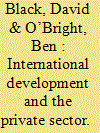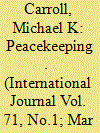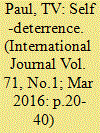|
|
|
Sort Order |
|
|
|
Items / Page
|
|
|
|
|
|
|
| Srl | Item |
| 1 |
ID:
143522


|
|
|
|
|
| Summary/Abstract |
The New Colombo Plan (NCP), a key plank in the Australian government’s foreign policy agenda, leverages student mobility as public diplomacy to improve Australia’s standing and influence within the Indo-Pacific region. Conceptualized as a “rite of passage” for young Australians, the NCP has been welcomed by Australian business, industry groups, and stakeholders because of its potential to deliver lasting relationships and practical economic benefits. Coordinated by the foreign affairs portfolio, the NCP represents a significant and distinct component of Australia’s public diplomacy, firmly aligned to advance the state’s economic diplomacy agenda. This paper explores the evolution of the NCP. It draws on stakeholder impressions from the program launch and pilot to explore early limitations and deeper soft power challenges. Findings suggest that the NCP is robust, yet key issues of strategic coherence, partnership, and evaluation require further attention if it is to deliver on its soft power promise.
|
|
|
|
|
|
|
|
|
|
|
|
|
|
|
|
| 2 |
ID:
143523


|
|
|
|
|
| Summary/Abstract |
A key strength of Canada’s international education engagement is its openness to a multi-faceted exchange of knowledge and ideas across borders. But while Canada excels and continues to grow in international research collaboration, institutional partnerships, and inbound student mobility, its performance in the realm of outbound mobility is less impressive: a mere 3.1 percent of university students participate annually. Participation of college and high school students is even lower. This paper looks at recent developments in Canada and six other countries and regions to compare approaches regarding international learning experiences. It first examines the Canadian situation, then the various rationales for a high degree of participation in education abroad, followed by a review of international approaches. It concludes that Canada needs to redouble its efforts and investments or young Canadians will be less equipped to participate than their peers from other countries.
|
|
|
|
|
|
|
|
|
|
|
|
|
|
|
|
| 3 |
ID:
143519


|
|
|
|
|
| Summary/Abstract |
The defence of Arctic sovereignty has gathered high levels of support from the Canadian population in the past 40 years. However, the relationship between public opinion and decision makers is more ambiguous, in particular that between decisions taken by the governing party and an effect in the general population. This is especially true for foreign policy issues. Hence, this article offers a test to assess whether standing up for Arctic sovereignty translates into concrete political gains for the governing party. We gathered federal party support levels reported in 859 opinion polls conducted from 2006 to 2014 in Canada. By focusing on sovereignty operations held by National Defence Operations NUNALIVUT and NANOOK and aggregating poll results into a “poll of polls,” we found that standing up for Arctic sovereignty is politically profitable in certain circumstances.
|
|
|
|
|
|
|
|
|
|
|
|
|
|
|
|
| 4 |
ID:
143524


|
|
|
|
|
| Summary/Abstract |
Historically, the relationship between the private sector and international development has been deeply ambivalent. For many, a vibrant private sector and competitive markets are the essential prerequisites of development. For many others, development is principally concerned with ameliorating the dislocation associated with capitalist profit seeking. In the last generation, this ambivalence has given way to an emphasis on the complementarities between the private sector and development. Yet skeptics have continued to criticize the form of development this trend has promoted. We review the historical conditions behind this trend; the controversies concerning transnational corporations and foreign direct investment; the rise of corporate social responsibility; the parallel rise of philanthrocapitalism; and the growth of micro-credit as a market-oriented vehicle for poverty alleviation and empowerment. When taken together, it is clear that private sector actors have become increasingly influential in the new landscape of development, yet their effects remain ambiguous.
|
|
|
|
|
|
|
|
|
|
|
|
|
|
|
|
| 5 |
ID:
143517


|
|
|
|
|
| Summary/Abstract |
The idea of international law figured centrally in Canadian legal professionals’ explanations of the First World War and its justness. Germans were described as perfidious enemies, unwilling to respect law and all too capable of egregious violations of it, whose actions posed an enormous threat to the stability and endurance of the international state system and its legal order. The war, then, was understood as a struggle to safeguard international law against the “savagery” of a world where sovereign states held no regard for lawful conduct. Based on an analysis of Canadian legal publications produced during the war, this article argues that legal attention to international law during the war not only helped to define the conflict but also set the conditions for the internationalism that developed in the postwar years. These concerns about the violation of international law continue to be urgent matters for policymakers and legal analysis today.
|
|
|
|
|
|
|
|
|
|
|
|
|
|
|
|
| 6 |
ID:
143525


|
|
|
|
|
| Summary/Abstract |
For Canadians there has been a great mystique surrounding peacekeeping. The idea that Canada is—or perhaps more appropriately was—a peacekeeping nation par excellence resonates deeply. Yet, however good this myth has made Canadians feel about themselves and their international contributions, it has ultimately done a disservice, leading to unrealistic expectations about what Canada and the blue berets could accomplish on the world stage. Furthermore, Canada’s involvement in United Nations peacekeeping operations has not been motivated solely by altruism, but rather has been based on eminently practical factors of national self-interest. There is much that the Canadian Armed Forces has to offer the world in terms of future peace and security operations, but it remains to be seen whether peacekeeping factors into this equation.
|
|
|
|
|
|
|
|
|
|
|
|
|
|
|
|
| 7 |
ID:
143521


|
|
|
|
|
| Summary/Abstract |
In recent years, the process of reconciliation between South Korea and Japan has been going backwards, at both governmental and societal levels. Previous studies, including those from historical, realist, and domestic perspectives, have attributed this to government-level actions only. This study, however, treats civil society as an active agent and scrutinizes evolving South Korea–Japan relations through the prism of cooperation/conflict between Japan’s civil society and its government. Cases involving forced sex slaves and history textbooks will be used to examine how Japan’s civil society affects policies on postwar issues, or to discover the reasons for their limited influence. Because such structural factors as the Japanese government’s control over civil society and civil society’s restricted influence on government cannot be changed rapidly, this study recommends that civil society organizations in each country form a transnational civil society as an alternative way to create solidarity and give meaning to Japanese civil society’s past efforts at reconciliation.
|
|
|
|
|
|
|
|
|
|
|
|
|
|
|
|
| 8 |
ID:
143518


|
|
|
|
|
| Summary/Abstract |
In this article I argue that it is much harder to deter and compel non-nuclear states and terrorist groups through the threat of use of nuclear weapons than proponents of nuclear use contend. A counter-proliferation strategy relying on nuclear threat and preventive war has serious limitations and may well be a source of nuclear proliferation rather than non-proliferation. While the fear of a retaliatory attack constrains a nuclear state from using its nuclear weapons against another nuclear state, a nuclear state may not be able to mount and execute a nuclear retaliatory strike against a non-nuclear state or a non-state actor for reasons beyond military calculations. The nuclear state could be restrained by self-imposed reputational concerns arising from moral, legal, and other normative considerations. This form of restraint can be aptly termed “self-deterrence.” This article first elaborates the concept of self-deterrence and then explores the core reasons for its prevalence. There may be multiple reasons for self-deterrence, including domestic politics, bureaucratic politics, and leaders’ psychology, especially in terms of risk aversion. However, in light of the historical record—especially instances from US nuclear history—reputational considerations appear to be crucial in explaining self-deterrence. These reputational considerations derive largely from three sources: the tradition of non-use of nuclear weapons, moral restraints, and legal principles regarding the use of nuclear weapons. I conclude by arguing that deterrence theory and policy need to take into account this aspect of self-deterrence along with cultural, psychological, and domestic-level constraints that have been presented as challenges to that theory’s premises and applicability.
|
|
|
|
|
|
|
|
|
|
|
|
|
|
|
|
| 9 |
ID:
143520


|
|
|
|
|
| Summary/Abstract |
Current best practices in peacebuilding emphasize the importance of integrated or comprehensive approaches that optimize donor state resources through improved coordination and coherence among the security, diplomacy, and development sectors. While these “whole-of-government” approaches have improved donor state engagements in fragile and conflict-affected states in recent years, donor governments have generally failed to effectively engage segments within their home societies that may not be active in peacebuilding activities but that have potential to influence peacebuilding outcomes abroad. A “whole-of-society” approach allows governments to identify and draw from non-traditional actors.
|
|
|
|
|
|
|
|
|
|
|
|
|
|
|
|
|
|
|
|
|